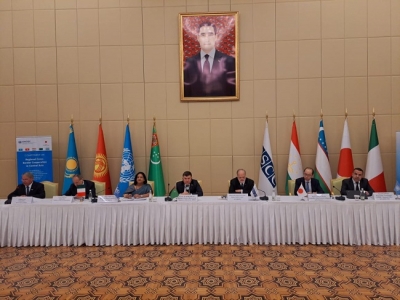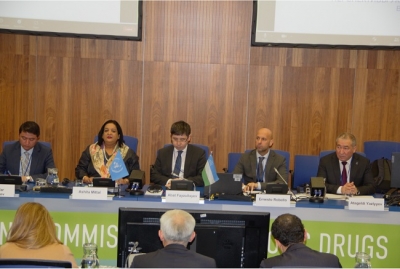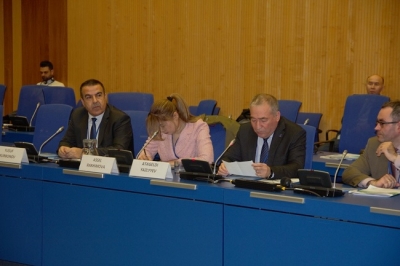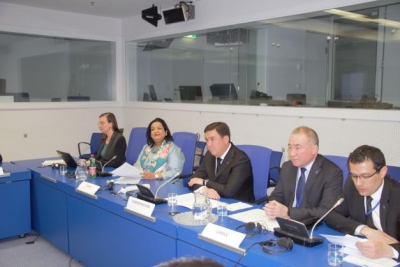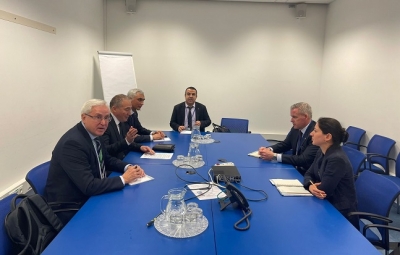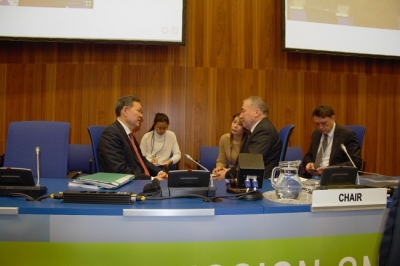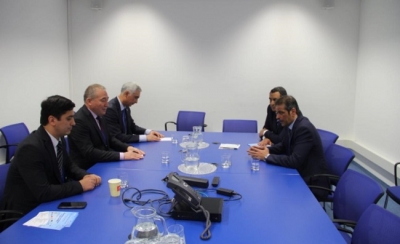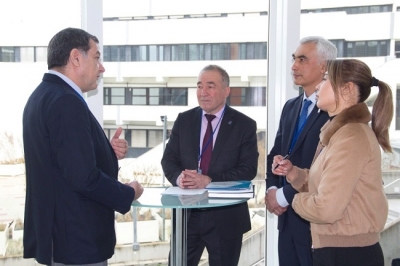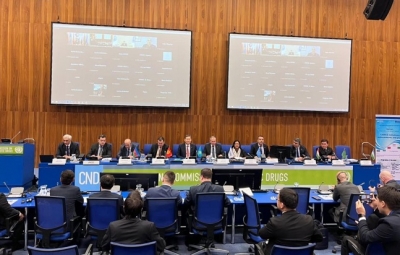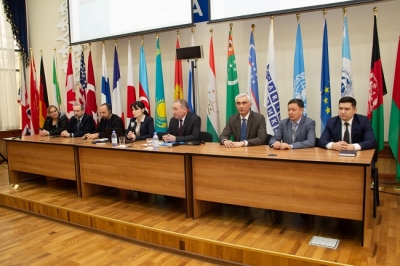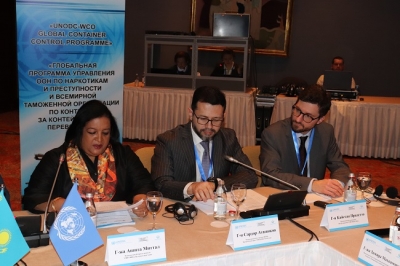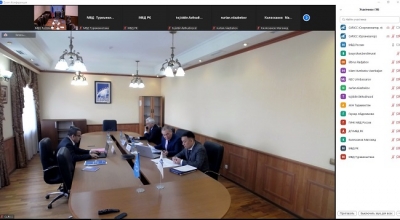Breaking news (521)
Ashgabat hosted a regional workshop on countering illicit trafficking of drugs and new psychoactive substances
In Ashgabat (Turkmenistan), on March 28-29, 2023, a regional workshop on countering illicit trafficking of drugs and new psychoactive substances was held in a hybrid format.
The event organized jointly with the OSCE Center in Ashgabat and the UNODC Regional Office for Central Asia. It was attended by delegations of the competent authorities of the countries of Central Asia, Italy, representatives of UNODC, OSCE and CARICC.
Head of the OSCE Center in Ashgabat Ambassador John Macgregor, representative of the Ministry of Internal Affairs of Turkmenistan, UNODC Regional Representative Ms Ashita Mittal, Ambassador of Italy in Ashgabat Mr Luigi Ferrari, Deputy Head of the Embassy of Japan in Turkmenistan Hideki Hosaka spoke at the opening of the seminar.
At the meeting, the participants exchanged of views on the emerging drug situation in Central Asia, and discussed the existing mechanisms to combat drug trafficking in the region.
The delegations of the Central Asian countries made presentations on the national experience in combating the new challenges of the drug threat in their countries.
Within the framework of the session “Law Enforcement and Legislative Measures to Counter the Spread of New Psychoactive Substances”, a representative of CARICC made a presentation.
ON THE PARTICIPATION OF THE DELEGATION AND CARICC IN THE PARALLEL EVENT, ORGANIZED BY THE REPUBLIC OF UZBEKISTAN
On March 16, 2023 in Vienna, within the framework of the 66th session of the UN Commission on Narcotic Drugs, the CARICC delegation headed by Director Yazlyev A.O. took part in a side event organized by the Republic of Uzbekistan jointly with the UNODC Regional Office for Central Asia and the Central Asia Drug Prevention Program (CADAP 7) on the topic “Uzbekistan’s efforts to strengthen a drug-free world: prospects for strengthening regional cooperation in the anti-drug sphere."
The event was moderated by the Ambassador of the Republic of Uzbekistan in Vienna, Abat Fayzullaev, and the UNODC Regional Representative for Central Asia, Ashita Mitall.
The event was attended by representatives of the competent authorities of the CARICC member states, employees of the UNODC headquarters, as well as permanent missions of countries to international organizations in Vienna.
During the event, the organizers showed a video with a subsequent presentation on the trends in the drug situation in the Republic of Uzbekistan for 2022, measures taken in the country to combat drug trafficking, preventive measures in the anti-drug sphere, as well as initiatives to create mobile groups in the region as part of the implementation of Regional UNODC programs.
In his speech, CARICC Director A. Yazlyev noted that the Republic of Uzbekistan takes an active part in organizing and holding various international and regional events, including anti-drug operations, trainings and seminars held under the auspices of the SCO and CARICC. He emphasized support for the efforts of the Republic of Uzbekistan undertaken on the anti-drug track and expressed readiness to build up close cooperation in order to jointly suppress international drug trafficking and transnational drug crime.
On the participation of the CARICC delegation in a side event organized by the Republic of Tajikistan
Within the framework of the 66th session of the UN Commission on Narcotic Drugs in Vienna, on March 15, the CARICC delegation headed by Director Yazlyev A.O. took part in a side event organized by the Republic of Tajikistan on the topic “Overview of the drug situation in Tajikistan in 2022”.
The event was attended by leaders and representatives of UN member states, international organizations and civil society.
The main trends in the drug situation in the country, as well as the measures taken by the Government of the Republic of Tajikistan, international and public organizations in the field of drug control and drug addiction prevention, including the strengthening of the State Border and the development of international cooperation, as well as the implementation of anti-drug programs in country.
In turn, the Director of CARICC in his speech emphasized that Tajikistan is actively contributing to the fight against international drug trafficking. The annual preparation and publication by the Drug Control Agency of the “Overview of the Drug Situation in the Republic of Tajikistan” is a contribution to the process of analyzing regional trends in drug trafficking and abuse.
On the participation of the CARICC delegation in the side event organized by Turkmenistan
On March 15, 2023 in Vienna, within the framework of the 66th session of the UN Commission on Narcotic Drugs, the CARICC delegation headed by Director Yazlyev A.O. took part in a side event organized by Turkmenistan jointly with the UNODC Regional Office for Central Asia on the topic “Active dialogue in the prevention of illicit drug use”. CARICC also acted as a co-organizer of this event.
The event was attended by the heads of the competent authorities of the CARICC member states, representatives of UNODC in Vienna, as well as permanent missions of countries to international organizations in Vienna, international and regional organizations.
The organizers of the event provided information on the measures taken by Turkmenistan to prevent the illegal use of narcotic drugs, including the implementation of initiatives in the country in the fight against drug trafficking, as well as a number of other aspects related to the prevention of drug addiction.
The Director of CARICC A. Yazlyev, in his speech noted the importance of the measures taken by Turkmenistan aimed at preventing the illegal use of narcotic drugs, including measures to combat drugs and prevent drug addiction in general.
Meanwhile, taking into account the development of the current drug situation in the region, the intensification of joint efforts in the fight against transnational and organized drug crime, the strengthening of international cooperation, as well as the development of an active dialogue in the anti-drug sphere with the full support of UNODC was emphasized in order to coordinate the efforts of the entire world community.
He also noted that Turkmenistan, being a member of the UN Commission on Narcotic Drugs for 2020-2023, initiates joint coordinated actions in the fight against drugs and actively promotes international and regional cooperation in the field of drug trafficking.
Along with this, an initiative was also expressed to solve problems through the prism of CARICC, which has a set of tools to unite the efforts of the competent authorities of the countries of the region in the fight against transnational organized drug crime and drug trafficking.
Image Gallery
https://caricc.org/index.php/en/publications/news?start=168#sigProId788049c982
On holding a meeting of the CARICC delegation with representatives of the International Criminal Police Organization "Interpol"
On March 14, 2023, on the sidelines of the 66th session of the Commission on Narcotic Drugs, a meeting of the CARICC delegation headed by Director Yazlyev took place with representatives of the International Criminal Police Organization «Interpol».
The Director of CARICC informed about the current activities of the Center, as one of the large-scale and significant projects of UNODC in Central Asia, the drug situation in the countries of Central Asia, as well as the main activities of the Center, the results achieved and plans for the near future.
The parties discussed issues of interaction between CARICC and Interpol in the area of information exchange on the drug situation and the fight against cross-border organized drug crime.
The meeting participants also discussed a number of current and future issues of mutual interest.
On holding a meeting of the Director of CARICC with the First Deputy Minister of Foreign Affairs of the Republic of Kazakhstan, Mr. Kairat Umarov
On March 14, 2023, following the results of the side event held by CARICC, a meeting was held with Director Yazlyev A.O. with the First Deputy Minister of Foreign Affairs of the Republic of Kazakhstan, Mr. Kairat Umarov.
During the meeting, issues of cooperation in the field of combating drug trafficking, as well as a number of other issues related to the activities of CARICC were discussed.
Information was provided on the measures taken to address the issues of financing CARICC by donor countries, including measures that provide for assistance by the Center in conducting special anti-drug operations, including controlled deliveries.
Mr. K. Umarov confirmed his interest in further development and strengthening of cooperation with CARICC, and also expressed Kazakhstan's support in considering
issues of ensuring its uninterrupted functioning.
At the same time, the Director of CARICC expressed gratitude to the Kazakh side for the support provided to the activities of the Center, including financial ones, and also expressed hope for further support in resolving issues of developing the activities of the Organization.
On the meeting of the CARICC delegation with the leadership of the Criminal Information Center to Combat Drugs (GCC-CIC)
On March 13, 2023, on the sidelines of the 66th session of the Commission on Narcotic Drugs, held from March 13 to 17 in Vienna, a meeting of the CARICC delegation headed by Director Yazlyev A.O. with the Director of the Gulf Cooperation Council Criminal Information Center to Combat Drugs (GCC-CIC), Mr. Eisa Saeed Al Kuwari.
The parties presented information on the current activities of the two centers in the regions of the Arab States of the Gulf and Central Asia, and also discussed the drug situation in the member countries of their organizations.
During the meeting, the parties discussed the practical aspects of bilateral cooperation against the backdrop of a rapidly changing drug situation and an increase in seizures of hard drugs in their regions.
On holding a meeting of the CARICC delegation with the representative of the UNODC in Vienna, Mr. Tofig Murshudlu
On March 13, 2023, on the sidelines of the 66th session of the Commission on Narcotic Drugs, held from March 13 to 17 in Vienna, a meeting of the CARICC delegation headed by Director Yazlyev A.O. with the UNODC Representative in Vienna, Mr. Tofig Murshudlu.
During the meeting, the parties exchanged views on the state and prospects of international cooperation, discussed issues of joint cooperation within the framework of anti-drug projects implemented under the auspices of the UN, as well as the provision of financial and technical assistance to CARICC.
Along with this, Mr. T.Murshudlu emphasized the importance of CARICC as a regional anti-drug organization that has achieved positive results in practical activities that are important for the participating states and the region as a whole.
Mr. A. Yazlyev expressed gratitude to the UNODC representative for the support provided by CARICC and expressed readiness to intensify cooperation in the implementation of joint anti-drug projects.
More...
CARIСC SIDE EVENT WITHIN THE 66TH SESSION OF UN COMMISSION ON NARCOTIC DRUGS
In the period from March 13 to March 17, 2023 in Vienna, the CARICC delegation headed by Director Yazlyev A.O. takes part in the 66th session of the UN Commission on Narcotic Drugs.
Along with this, on March 14, 2023, on the sidelines of the 66th session of the CND, CARICC, together with its participating States and the UNODC Regional Office for Central Asia, organized and held a hybrid side event on the theme “CARICC Initiatives, achievements and plans”.
The event was attended by the heads of the competent authorities and foreign ministries of the CARICC member states, the UNODC Regional Representative for Central Asia Ms. Ashita Mitall, representatives of the permanent missions to the international organizations in Vienna, observer states to CARICC, international organizations, as well as donor-countries and partners.
Advisor/Head of the Information and Analytical Division of CARICC, Mr. Azizbek Erkaboev was the moderator of side event.
CARICC Director Yazlyev A.O. opened the event. In his speech, he emphasized that the Center continues to be an organization that fulfills the tasks assigned to it in combating transnational organized drug crime.
Further, the First Deputy Minister of Foreign Affairs of the Republic of Kazakhstan, Mr. Kairat Umarov, delivered a welcoming speech. In his speech, he emphasized the importance of CARICC as a regional anti-drug organization, and against the background of the growth of drug production in Afghanistan and the increase in large-scale smuggling of opiates and methamphetamine to the countries of the region, it is able to withstand challenges and threats in the fight against transnational drug crime.
In a welcoming speech by the UNODC Regional Representative for Central Asia Ms. A. Mitall, the importance of mutual practical cooperation in the fight against organized crime, as well as the need for financial support for the CARICC project from participating States and donor countries.
In addition, the heads of the competent authorities of Azerbaijan, Kyrgyzstan, Tajikistan, Turkmenistan and Uzbekistan delivered a welcoming speech, where they noted the role of the Center in the fight against transnational drug crime and its capabilities in the Central Asian region.
In the main session of the side event, a video with brief information about the activities of CARICC and a presentation on initiatives, achievements and plans of CARICC were shown.
In addition, law enforcement officials and international organizations and partners of the Center took part in the event online. More than 100 people took part in the side event.
On the sidelines of the CND session, it is planned to hold a number of bilateral and multilateral meetings with representatives of interested departments of the CARICC member states, international and regional organizations.
Conducting a national training course for law enforcement officers of Turkmenistan
As part of the UNODC initiative to strengthen regional cross-border cooperation by strengthening the capacity of Border Liaison Offices (BLOs) in Central Asia of Sub-program 1 of the UNODC Program for Central Asia for 2022-2025, from February 27 to March 3, 2023 in Almaty, on the basis of CARICC, a national training course was held on the use of the IBM "i2" software and the use of the BLOs database, as well as new psychoactive substances (NPS) for law enforcement officers of Turkmenistan.
This training course helped improve the skills of law enforcement officials in identifying organized criminal groups involved in the production and distribution of synthetic drugs, as well as strengthening international cooperation in this area.
Employees of CARICC and the Central Anti-Drug Administration of the Ministry of Internal Affairs of Italy acted as experts.
According to the participants, the training course corresponded to the functional duties of the trainees and turned out to be useful in the daily service and military activities of law enforcement officers.
The participants of the training highly appreciated the organization of the event and the way the training material was presented.
Image Gallery
-
 Click to open image!
Click to open image!
Click to open image!
Click to open image!
-
 Click to open image!
Click to open image!
Click to open image!
Click to open image!
-
 Click to open image!
Click to open image!
Click to open image!
Click to open image!
-
 Click to open image!
Click to open image!
Click to open image!
Click to open image!
-
 Click to open image!
Click to open image!
Click to open image!
Click to open image!
https://caricc.org/index.php/en/publications/news?start=168#sigProIda84201bbd6
About participation of CARICC in the interregional meeting of experts within the framework of the Interregional Network of Customs Services and Port Control Groups
On February 22–23, 2023, the fifth interregional meeting was held in Almaty in the framework of the Global Container Control Program of the UN Office on Drugs and Crime and the World Customs Organization.
The heads and experts of customs services, as well as other competent agencies of Azerbaijan, Georgia, Kazakhstan, Kyrgyzstan, Pakistan, Tajikistan, Turkmenistan and Uzbekistan attended this event.
Opening the event, Chairman of the State Revenue Committee of the Ministry of Finance of the Republic of Kazakhstan Mr D.Zhanalinov noted that this meeting is a convenient platform for discussing topical issues in the customs sphere and contributes to the development of interregional cooperation.
Ms. Ashita Mittal, UNODC Regional Representative for Central Asia, welcomed the participants.
During the two-day meeting, the participants discussed the results of the interregional operation to curb illicit trafficking in tobacco products, shared successes, difficulties and lessons learned in the coordination of the operation. Further, the issue of multilateral and bilateral practical cooperation within the framework of the IREN Network was discussed, including progress, priorities and proposals for further consolidating success.
During the meeting, the tendencies of the development of the drug situation in the region, the measures taken to prevent the use of legal international trade and transit corridors for the purposes of drug smuggling were considered. In this area, CARICC staff made presentations on "CARICC as a leading platform for promoting and coordinating joint anti-drug operations" and "CARICC's achievements, potential and experience in the information and analytical direction of activity." The representative of CARICC emphasized the importance of analytical work aimed at solving the problems of operational and strategic response to drug trafficking and combating transnational organized crime.
The participants emphasized the need to strengthen cooperation mechanisms and prompt exchange of information, establish and expand ties, timely resolve problematic issues of practical interaction between national contact persons of customs services and port control groups of the countries participating in the Interregional Network and the opportunity to exchange information.
At the end of the event based on the results of the Interregional Expert Meeting, relevant recommendations developed.
Image Gallery
-
 Click to open image!
Click to open image!
Click to open image!
Click to open image!
-
 Click to open image!
Click to open image!
Click to open image!
Click to open image!
-
 Click to open image!
Click to open image!
Click to open image!
Click to open image!
-
 Click to open image!
Click to open image!
Click to open image!
Click to open image!
-
 Click to open image!
Click to open image!
Click to open image!
Click to open image!
-
 Click to open image!
Click to open image!
Click to open image!
Click to open image!
https://caricc.org/index.php/en/publications/news?start=168#sigProIdd28a59d5b9
About an extraordinary meeting of the Council of National coordinators of CARICC member states
On January 31, 2023, an extraordinary meeting of the Council of National Coordinators (CNC) of the participating States of the Central Asian Regional Information Coordination Center for Combating Illicit Trafficking in Narcotic Drugs, Psychotropic Substances and Their Precursors (CARICC/Center) was held online.
Delegations of CARICC member states, UNODC International Program Coordinator Mr. Yusuf Kurbonov, as well as the Director and staff of the Center attended the event.
The meeting was chaired by the Head of the Department for Combating Drug Crime of the Ministry of Internal Affairs of the Republic of Kazakhstan Mr. Kh.Imazhanov.
At the meeting, the Director of the Center A. Yazlyev provided information on the current financial situation in CARICC. Y. Kurbonov also reported on the measures taken to ensure the financial stability of CARICC as a UNODC project.
The meeting participants discussed current and future issues of financing the activities of the Center, following which the relevant decisions were made.
Image Gallery
https://caricc.org/index.php/en/publications/news?start=168#sigProIde65eda87bb

